Traveling with a newborn — or any tiny human — can be daunting for any mom. In particular, flying with a baby leaves a new space to navigate (no pun intended). No matter how seasoned of a traveler you might have been before becoming a parent, bringing a child along adds a new level of preparation. This can be stressful if you don’t have a clear plan.
With proper planning, your vacation with your newborn, infant, or toddler in tow can still feel like a vacation. It can be an excellent opportunity to make lasting memories with your family and reset physically, mentally, and emotionally as a parent. Read on for our top travel tips for vacationing with a little one.
This is a personal decision, and there are many factors to consider when flying with a baby. Experts recommend that, at the minimum, babies should be full-term and no younger than 7 days old before flying.1 Many parents wait until 3-4 months of age before flying with their baby in tow. This allows time for the baby’s immunity to build up. Plus, you might find it helpful to give yourself some time to establish familiarity with your little one’s sleep habits, daily routine, and personality before embarking on a big adventure.
Once you’ve decided that you — and your newest family member — are ready for your first vacation together, it’s time to get planning. Finding baby-friendly destinations is the first step in making this happen. The options are endless for where you decide to jet off to, but there are a few key ways to guarantee you’re choosing a foolproof, baby-friendly destination:
Download PDF Here
Whether looking into hotels and resorts or privately owned rental properties, reading reviews from former guests is a basic step you won’t want to skip while making travel plans. Keyword searches within reviews can tell you a lot about how infant, toddler, or kid-friendly locations are.
Compare Amenities and Property Specs
Researching amenities available onsite is another key piece of vacation planning with a baby. In particular, consider scoping out properties with onsite laundry, full kitchens, and bathtubs (versus standing showers). Trust me, these factors will make your stay with your little one much more efficient and enjoyable!
Depending on how much time you plan to spend at your property of choice while on vacation, you might also be interested in seeking out properties with amenities and offerings like kiddie pools, onsite childcare, and kids’ clubs. While these are not necessarily crucial for a superb vacation experience, they can add value to your family’s time away from home.
At the bare minimum, you’ll want to ensure wherever you’re staying is baby-friendly. Is there space for a pack-and-play or crib in one of the bedrooms — and a high chair in the dining area? Better yet, is there an option to have the necessary baby gear set up and waiting for you upon arrival?
Consider furnishings and even decor if you have a tiny tot just beginning to crawl (or walk). After all, you won’t want to spend your vacation worrying about racking up additional fees for damaged property (or injuries).
Research Family-Friendly Activities, Attractions, and Eateries
Wherever you consider traveling, research activities and attractions that will keep the whole family happy and entertained. Whether that means stroller walks through quaint shopping villages, laidback days on the beach, or the excitement of full-fledged amusement and theme parks, determine your family’s priorities and go from there.
In addition, you’ll want to consider restaurants and eateries — especially if you have a kiddo with food intolerances or allergies. Preparing a list of child-friendly restaurants in advance can eliminate the stress of making last-minute meal reservations in a new area.
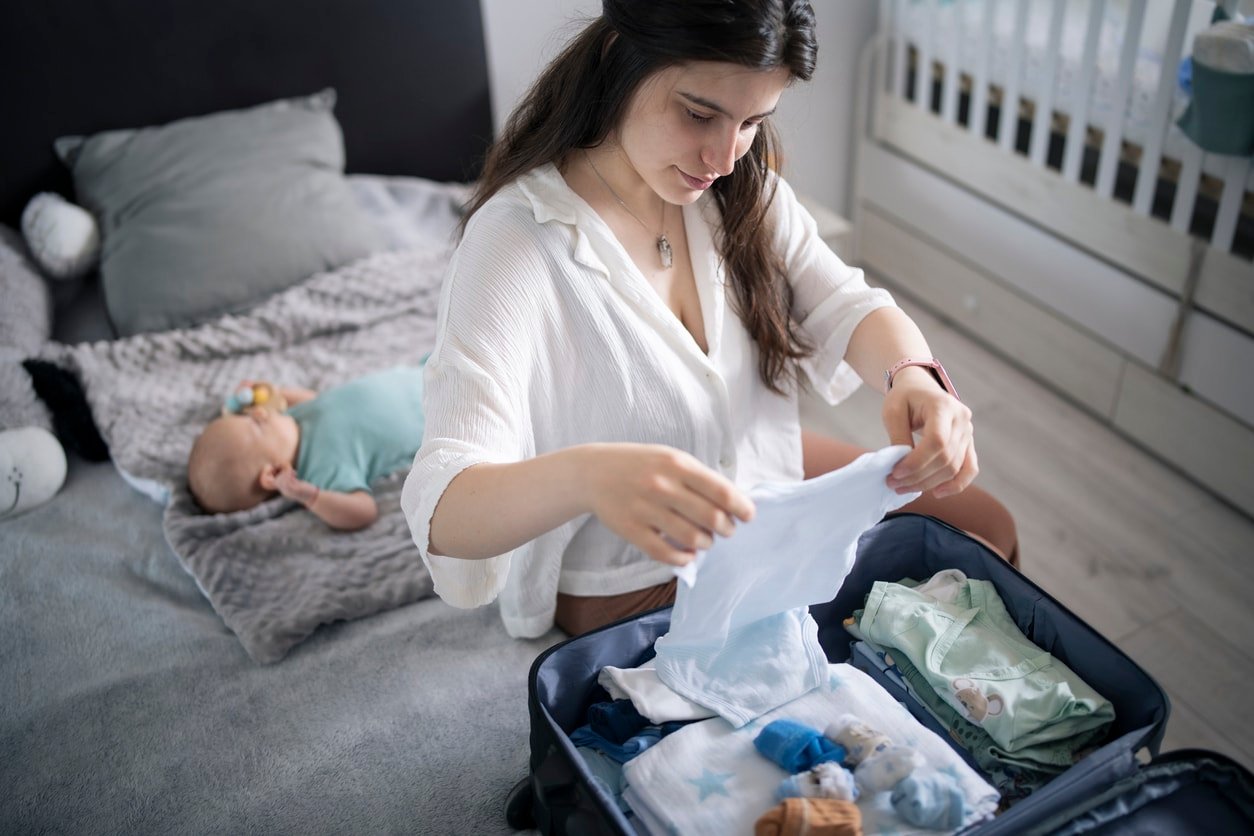
While you’ll want to be well-packed and prepared for your flight with your baby, it’s equally smart not to overpack. Sticking to the essentials ensures your hands can tend to your baby as easily as possible en route to your destination. Here’s an essential travel checklist of must-pack items for any parent planning on flying with a baby:
- A diaper bag backpack with insulated compartments for bottles, a small changing pad, and a safe space for baby’s travel documents (birth certificate or passport)
- A gallon bag with a few diapers, wipes, diaper cream, burp cloth, and a change of clothes for baby (and a wet bag for soiled baby clothes)
- For breastfeeding mothers: a small cooler/pump bag, a breast pump (wearable is excellent for travel), breastmilk storage bags, breast pump wipes, a cozy nursing cover, nipple balm, and an extra set of nursing pads
- For formula-fed babies: pre-measured formula, baby bottles, and bottled water
- A familiar, favorite soother for baby (such as a lovey)
- A few small toys and books
- A lightweight baby blanket
- Extra pacifiers, if your baby takes them
- Antibacterial wipes
- Snacks — for you and the baby
- A baby carrier to wear baby and/or a travel stroller
- Federal Aviation Administration (FAA)-approved car seat
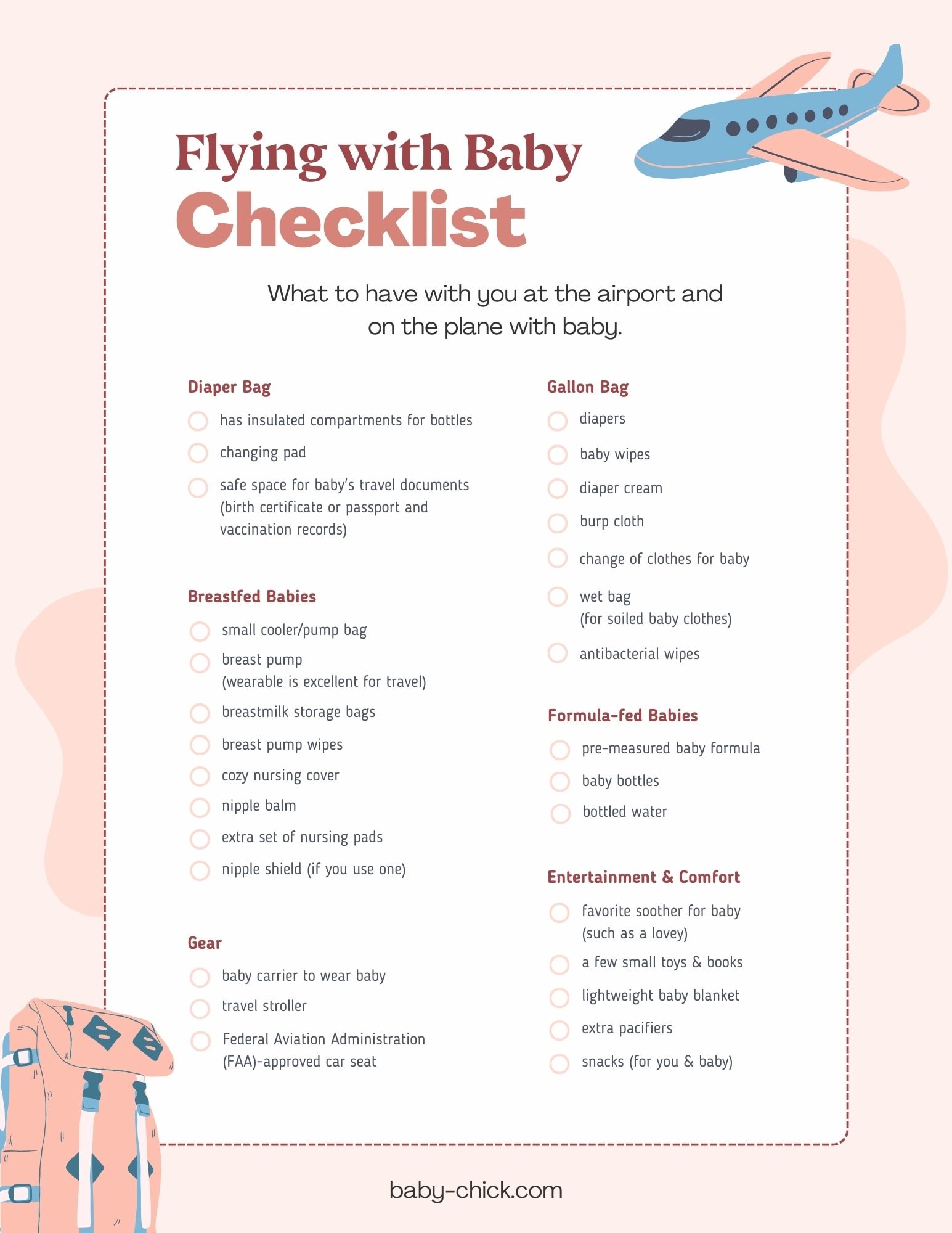
Download PDF Here
Flying with an infant requires strategic planning, but it’s not impossible. Some moms even find the early months to be ideal for traveling. After all, babies become increasingly mobile (read: squirmy) as time goes on. Why not take your youngest along for an adventure while they’re still sleeping many hours of the day? Here are some tips for flying with a baby:
1. Consider Flight Times (And Your Baby’s Temperament)
When booking your next getaway, consider what flight times make sense for your family. When my daughter was an infant, flying during daytime hours worked well because it allowed her to sleep normally at night. Then, when my son joined our family, I learned the hard way that flying early in the morning and late at night would disrupt both my kiddos’ sleep schedules (despite them resting on the plane for those flights).
As you book your flights, consider whether you’d prefer smoother sailing (aka a sleepier little babe) in the sky or fewer sleep disturbances through the night upon landing. What works for one family might not work for another!
It’s common for airlines to allow children under 2 years old to fly for free when seated on a parent or caregiver’s lap. However, the Federal Aviation Administration says an approved child restraint system is the safest place for children under 2.2 If you take the more cost-effective route, consider bringing a car seat anyway. If there are open seats upon boarding, most airlines will allow you to bring your child’s seat on board — free of charge — for safer flying. If not, you can gate-check your car seat and retrieve it upon landing.
When selecting a car seat for air travel, you’ll want to consider portability and ease of installation. You’ll also want to ensure your car seat’s measurements are within the allotted range for air travel (typically no wider than 16 inches).3
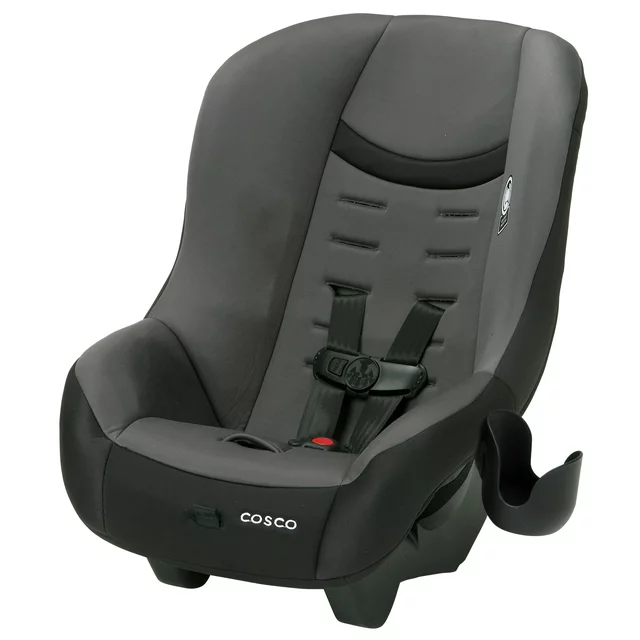
Buy Here
One option is the Cosco Scenera NEXT Convertible Car Seat. It’s lightweight, affordable, and certified for aircraft use, making it an excellent investment.
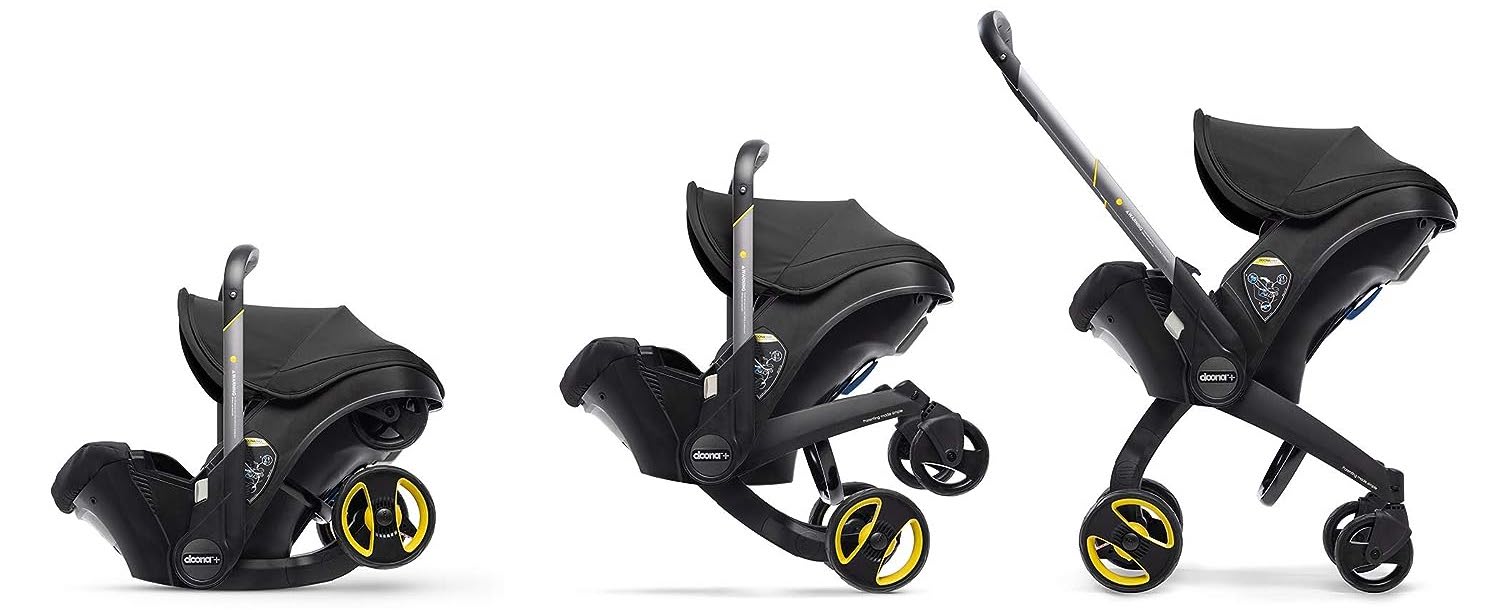
Buy Here
If you’ve got a baby who’s 35 pounds and 32 inches or less and your budget allows, the Doona Car Seat & Stroller is another wonderful option. This system simplifies travel and makes getting around airports a breeze!
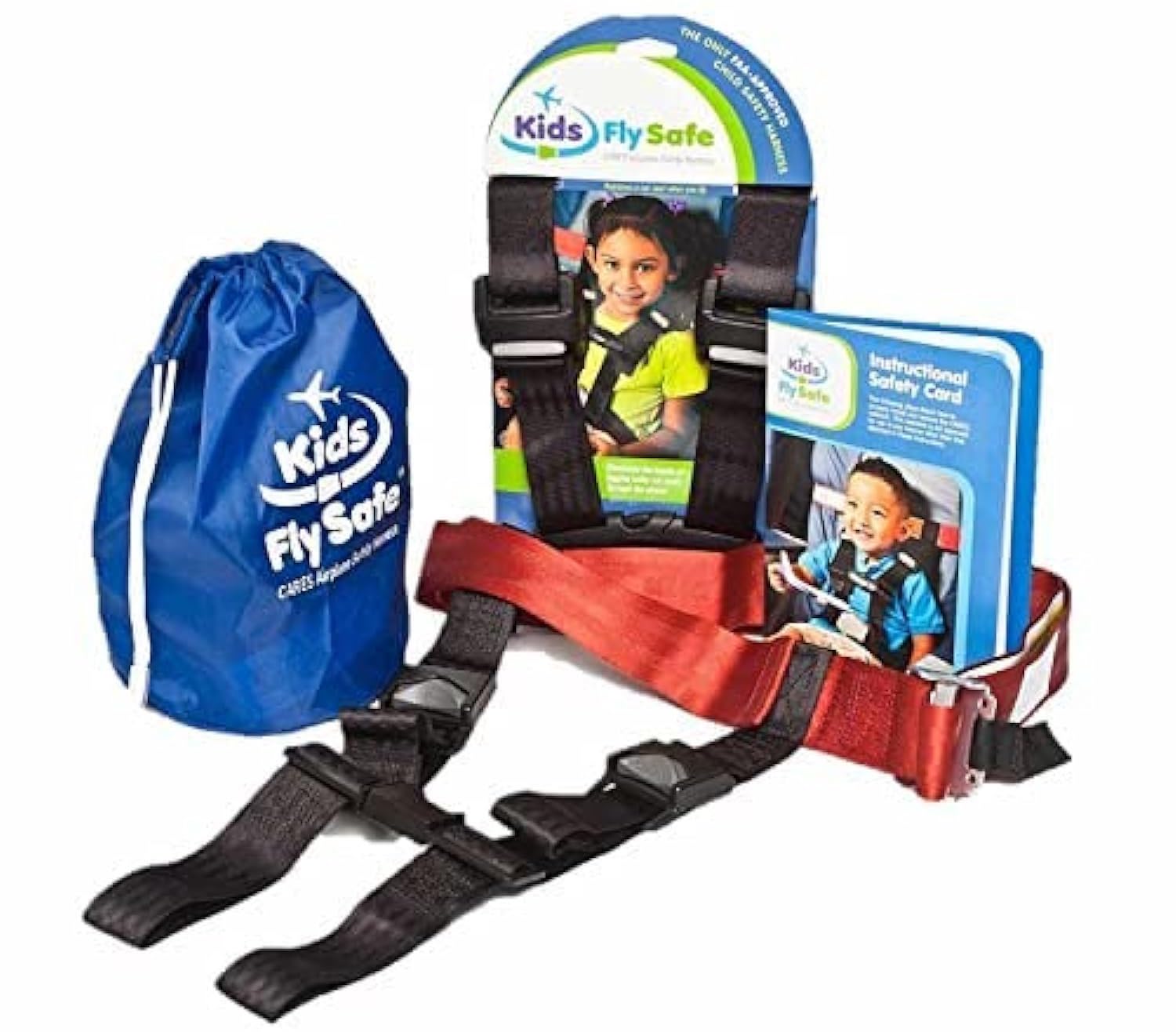
Buy Here
For forward-facing older toddlers and young children between 22 and 44 pounds, AmSafe’s Child Aviation Restraint System — commonly known as CARES — is another option. This FAA-approved restraint system supplements the existing aircraft seat belt for increased safety – and packs up quickly.
Whatever car seat you choose to take for your trip, you won’t regret it. In addition to offering added peace of mind in the air, bringing along your car seat ensures safer road travel once you reach your destination. While rental car companies typically have a selection of car seats, your own is always the most trustworthy option regarding history and cleanliness.
Most airlines will allow you to gate-check your stroller upon boarding, which is helpful when getting around the airport before and after your flight. If you’re worried about your kiddo’s ride getting damaged in transit, some compact, lightweight strollers like the GB Pockit can be folded up and carried on board for overhead storage.
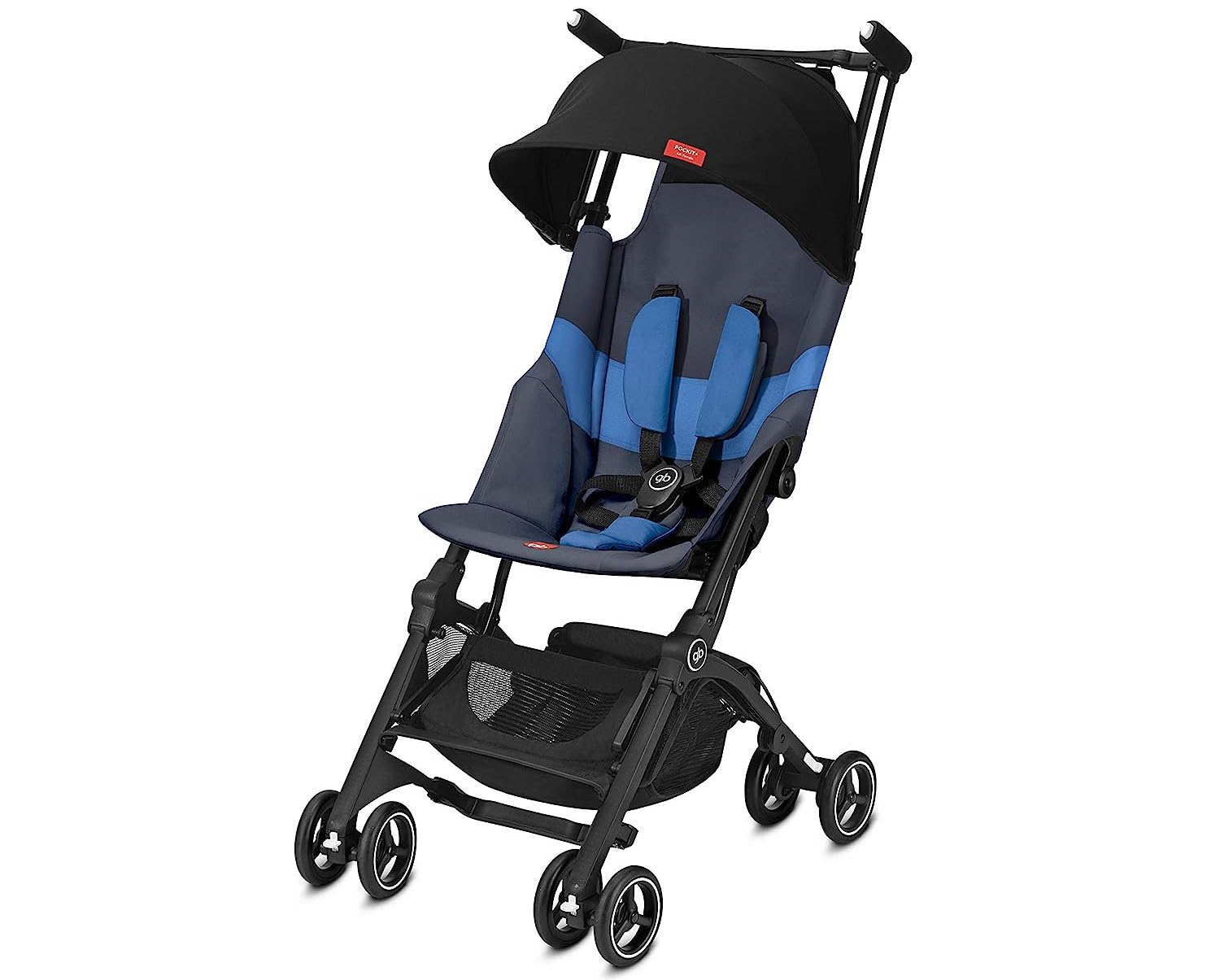
Buy Here
Flying with a baby means you might have to complete your normal duties — like changing diapers — differently than at home (or anywhere else). Airplane restrooms are space-limited (side note: check with your flight attendant to determine which, if any, has a changing pad), so it’s a good idea to have your changing essentials on hand and ready to go before takeoff. That way, you won’t have to worry about lugging your diaper bag into the restroom.
A gallon bag with a couple of diapers, a small pack of wipes, diaper cream, and a change of clothes should do the trick. I also recommend dressing your baby in easy-on, easy-off clothes (think: two-piece pant and top sets, zipper vs. button onesies, etc.) and changing your little one’s diaper in the airport restroom as close to boarding as possible.
Apart from a small changing bag, you’ll want to fill your diaper bag with all the important stuff: a bottle or two with formula or breast milk (breastfeeding mothers are allowed to carry a pumping bag and baby’s milk), baby’s favorite small toys, board books (or baby magazines — I love Highlights High Five to save space), snacks, and a cozy baby blanket.
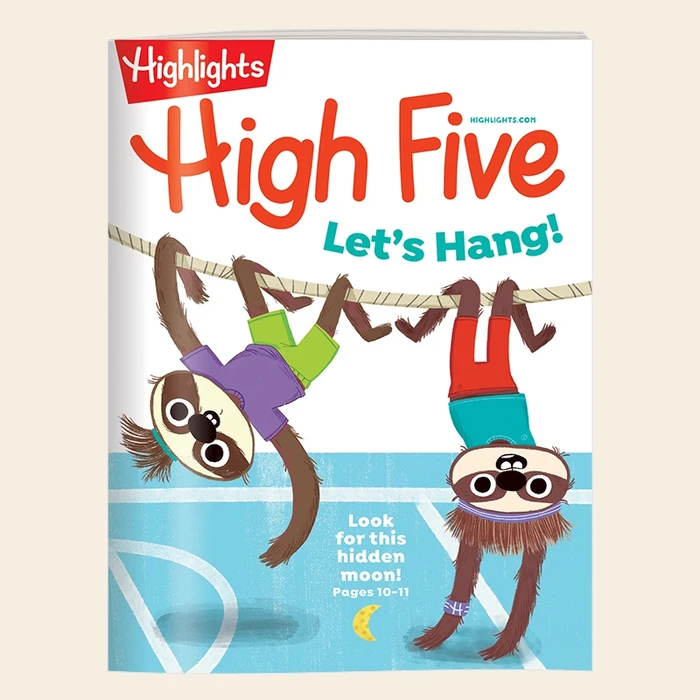
Buy Here
Depending on your baby’s needs and preferences, you might also want to bring a soother — like a pacifier or lovey — and any medications. Lastly, while babywearing is not typically allowed in the air, having a good carrier can be handy for everything leading up to and following the flight.
Flying with a baby inevitably yields a longer packing list, but you can cut some major corners regarding the bulky stuff. Traveling with diapers, for example, doesn’t have to mean packing an entire suitcase full of diapers. I love using my kiddos’ diapers as padding for other bulky baby gear, like our travel crib. Toss several packs of diapers in your checked baby gear carrying bag, and voila — no added bags (or luggage fees!). Ensure you have a sturdy carrying bag to protect your most valuable gear.
You might also opt to have diapers delivered straight to your destination — or even grab them along the way from the airport to your hotel, resort, or rental home.
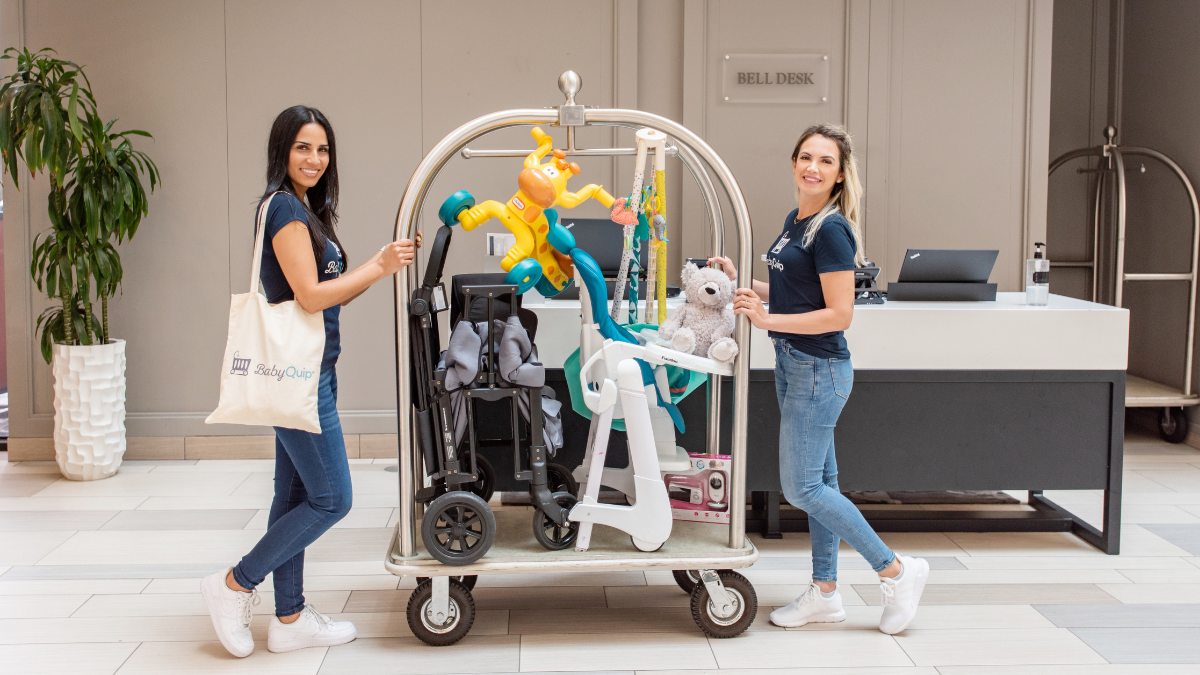
If you aim to pack light, look into baby gear rental services like those offered via BabyQuip. There, you can rent out everything from cribs and pack and plays to sound machines and toys to strollers, wagons, high chairs — and much more — from fellow parents in the U.S., Canada, Mexico, the Caribbean, Australia, Europe, and beyond.
It’s always smart to have hands-on entertainment planned for your little one’s journey. Especially if you have an older baby or a toddler. Simple but effective toddler airplane activities include:
I’d also recommend packing your child’s favorite stuffed animal or doll. A simple comfort item can make a big difference on travel day! Additionally, allowing your little one to carry their toddler backpack can be a fun (and practical) way to keep their special belongings easily accessible and in one place.
Flying with a baby is no easy feat. It is completely doable and can be worth the extra planning and preparation. No matter how your trip with your tiny tot goes, take a deep breath. Babies will be babies, but everyone else on every aircraft started as one. So, above all else, remember to give yourself — and your little one — lots of grace. This is a new experience for both of you! Safe and happy travels.